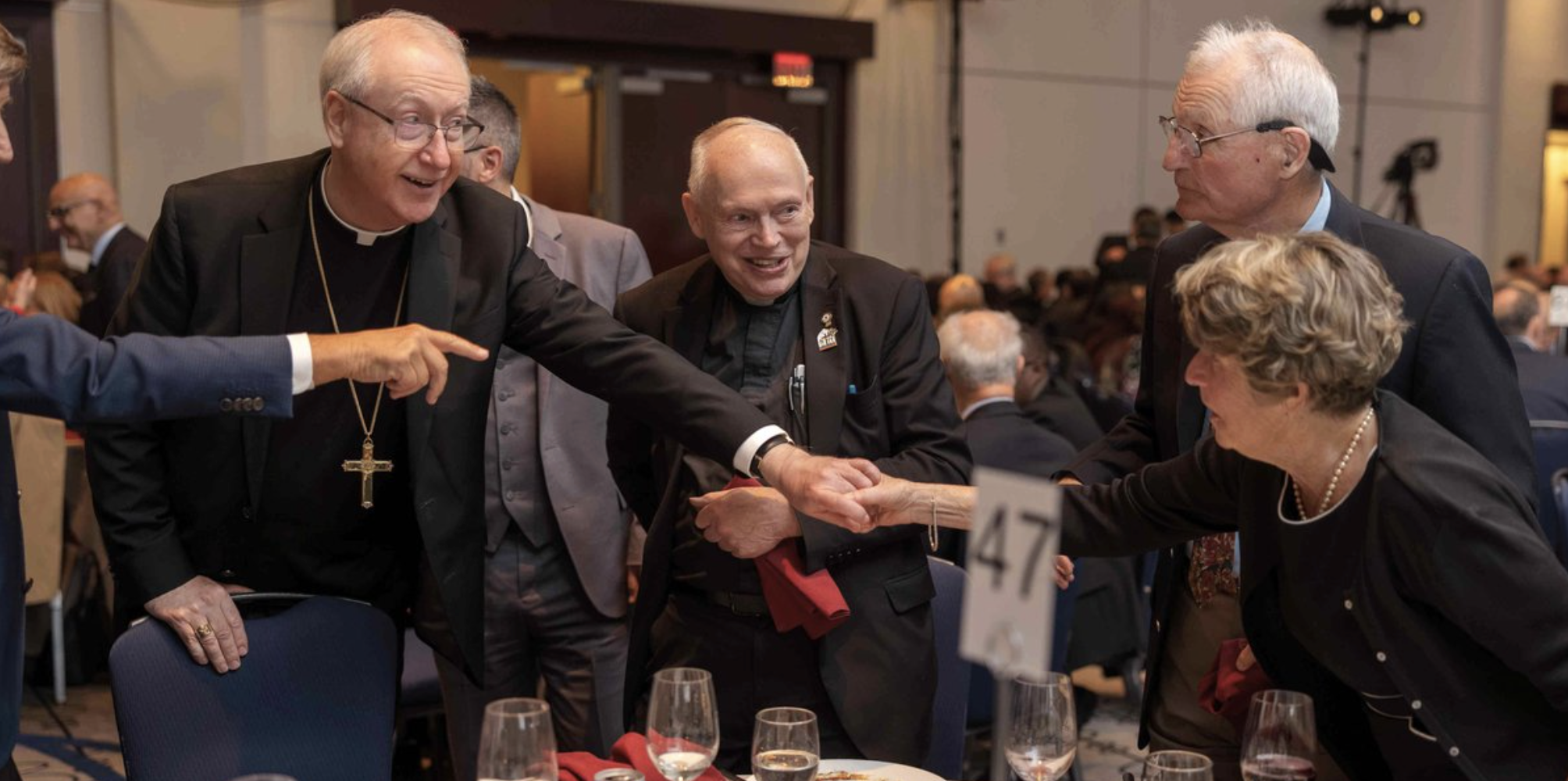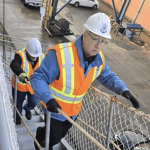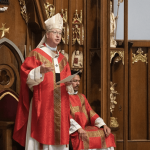VANCOUVER (CCN) — At his first Archbishop’s Dinner, Archbishop Richard W. Smith found inspiration in Vancouver residents’ concern with seismic safety, calling Catholics to pray for a different kind of earthquake — a “spiritual” one that topples barriers and rebuilds lives on the love of God.
The archbishop’s talk, delivered Oct. 22 before a sold-out hall at the Hyatt Regency Hotel, wove the city’s heightened awareness of earthquakes through a reflection on renewal, gratitude, and the mission of the Church.
Archbishop Smith said that since arriving in Vancouver in May, he has quickly learned how much discussion there is about seismic upgrades, and how that language offers a metaphor for faith.
“I haven’t lived in an earthquake zone,” he said, “so the frequent recourse to the need for seismic upgrades has been quite a revelation.”
Acknowledging the importance of strengthening buildings, he reminded his audience that “the Church is not bricks and mortar; she is mission.”
“As we move forward together,” he said, “I invite us also to think of the cry of God’s people for lasting stability not only in buildings but also, and far more importantly, in the foundations of their very lives.”
He described the instability that shakes the world today: “geopolitical instability, dramatic and at times lethal environmental changes, a widespread questioning of what it means to be a human being, enormous economic pressures… and a broad, often angry polarity separating peoples.” All of this, he said, “cannot help but have a deeply negative and fearful impact in hearts and minds craving stable environments.”
The archbishop pointed to the “existential earthquakes” that strike individuals through divorce, job loss, illness, addiction, or bereavement. For many years, he said, the Archdiocese has “stood in loving solidarity with persons who continue to experience the aftershocks and tremors occasioned by a traumatic collapse of hope.”
That solidarity, Archbishop Smith said, is not a call to brace against change but to welcome divine transformation.
“Our call at this moment is not to shield ourselves from an earthquake but to pray for one,” he said — “the salvific upheaval that accompanies the Lord whenever we allow him to take over and guide our lives.”
Recalling that the Gospel of Matthew describes Christ’s resurrection as being accompanied by an earthquake, he said that when God’s love touches human hearts, “it comes as an earthquake, shifting the foundation of our lives.”
That quake, he said, replaces “love of self” with “the love of God and his mercy,” breaking down “all the barriers we set up in our lives to separate us from God and one another.” From such “necessary destruction,” he said, “arises the beautiful and indestructible edifice we call the Church, the Body of Christ,” sent to “help rebuild the lives of others.”
“So, as we embrace this mission anew,” he urged, “let’s pray for the earthquake,” asking the Lord “to do great and wondrous things to break down barriers set up against his truth and justice, awaken solid faith within the hearts of all people, and grant sure and certain hope to those whose lives are rebuilt through the ministerial outreach of this Archdiocese.”
That outreach is getting an additional element in a new initiative that the archbishop announced, a new fund to help women in difficult circumstances.
“We have done much for people in need; we shall do even more. Impelled by our love for Christ and neighbour, we shall not rest from seeking new ways to offer concrete assistance to persons in any form of difficulty.”
The Church’s outreach differs from that of a social agency, he said. “It is important to keep in mind… that the service we offer is not that of a social service agency or NGO. We are the Church,” he said. “As the Body of Christ, our ministerial outreach aims to bring people to a life-giving encounter with the Lord Jesus.”
The archbishop also expressed gratitude to priests “steadily and notably very hard at work” in caring for parishioners and discerning renewal; to deacons and their families who serve “poor and otherwise marginalized persons”; and to lay volunteers who extend the Church’s mission to those most in need.
Recalling a recent visit to the Downtown Eastside, he said it was “eye-opening to see so many suffering from addiction and poverty,” yet “incredibly inspiring to witness generous disciples serving our brothers and sisters in need” through parishes such as St. Paul and Sacred Heart and programs like The Door Is Open.
He commended the consecrated women and men “who by their very presence radiate the joy that comes from knowing and following Jesus Christ,” noting that he recently consecrated the chapel altar for the Nashville Dominican Sisters’ new convent in Port Coquitlam. Two new priestly communities — the Claretians in East Vancouver and the Emmanuelites in Maple Ridge — have also joined the Archdiocese.
“Our Catholic institutions are exemplary,” he said, praising the commitment of parents, teachers, and administrators who sustain Catholic schools, and the generosity of the faithful who support Catholic colleges and healthcare facilities. He said he is grateful for Providence Health Care’s “determination to lead the way in care for the vulnerable.”
He added that outreach to Indigenous communities under the leadership of Archbishop J. Michael Miller has been “a beacon of both hope and direction to other Dioceses across the country.”
The archbishop closed with an expression of gratitude to everyone helping the Archdiocese of Vancouver make “a very large and positive mark in the province of British Columbia,” he said.
The Living Waters Fund
Archbishop Richard Smith announced that proceeds from this year’s Archbishop’s Dinner will be directed toward the new Living Waters Fund, a charitable initiative helping women facing adversity to find safety, healing, and new beginnings.
“Tonight, we gather to support Catholic ministries that accompany women through life’s most difficult seasons,” said Sean O’Brien, co-host of the dinner program.
Rooted in the Gospel story of the woman at the well, the Living Waters Fund will provide grants for:
• Safe refuge and long-term support for women fleeing abuse
• Outreach to women on the streets and those affected by sexual exploitation
• Assistance for single mothers building stable lives
• Healing for women facing trauma and injustice
Sister John Frances LaFever, FSE, reflected on the dignity of women through the words of Pope St. John Paul II. Quoting his 1995 Letter to Women, she recalled his desire “to reflect on the problems and the prospects of what it means to be a woman in our time,” and his call to thank God “for the mystery of woman, and for every woman.”
Sister LaFever said the timing of the fund is providential, noting that Pope Leo XIV recently released his first apostolic exhortation, Dilexi te (I Have Loved You), on love for the poor. “How remarkable,” she said, “that we are gathered here with our Archbishop to draw attention to the particular needs of women less than two weeks after our Holy Father wrote on concern for the poor and those facing violence.”
Deacon Zak Santiago linked the fund’s mission to Christian discipleship. “The Archbishop of Vancouver spoke of a mutual vulnerability, that which binds the minister with the captive, with the vulnerable other,” he said. “It applies directly to our theme this evening of empowering vulnerable women … constant in self-gift, constantly vulnerable to the other.”
The Living Waters Fund will support Catholic ministries that accompany women in crisis, including:
• Domestic Abuse Services (Our Lady of Good Counsel Society)
• Momentum, a program for Catholic single women
• Talitha Koum Society
• Sancta Maria House
To learn more or contribute to the Living Waters Fund, visit rcav.org/livingwaters.




